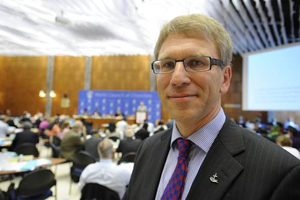
STEPHEN BROWN reports for Ecumenical News International…
Seeking military victory against the Taliban will not guarantee a “just peace” for the people of Afghanistan, says the head of the world’s largest grouping of churches.
“Violence will only come to an end if at the same time we build up Afghan society,” the Rev Olav Fykse Tveit, general secretary of the Geneva-based World Council of Churches, said in an interview with the Rheinischer Merkur, a German weekly newspaper, published on 6th May.

PICTURE: WCC/Peter Williams
“We have to ask what constitutes a sustainable and durable peace that is built on justice. It has to be a peace that offers people a future in which they can live in peace and justice and with decent living conditions.”
– Rev Olav Fykse Tveit, general secretary of the World Council of Churches
Rev Tveit was interviewed in advance of the 12th to 16th May Ecumenical Kirchentag, or church convention, in Munich organised by German Protestant and Roman Catholic groups. The WCC leader is to speak at the opening of the five-day event, which is expected to draw more than 100,000 participants.
The military conflict in Afghanistan has been hotly debated in Germany in recent months after Margot Kässmann, then the senior German Protestant bishop, decried the country’s military strategy there and called for alternatives to the use of armed force.
Germany has about 4,500 troops in Afghanistan, the third largest contingent in the NATO-led international force there.
Bishop Kässmann said in a New Year sermon that weapons were “clearly not creating peace” in Afghanistan.
In his Rheinischer Merkur interview, Rev Tveit noted that in the past churches had discussed the conditions under which war could be seen as “just” from a Christian point of view. However, it was now necessary, he said, “to speak of a just peace”.
The WCC leader said, “We have to ask what constitutes a sustainable and durable peace that is built on justice. It has to be a peace that offers people a future in which they can live in peace and justice and with decent living conditions.”
The Kirchentag has more than 3,000 individual events ranging from Bible study to concerts and podium discussions. It will deal with issues such as social justice in Germany, globalisation, war and peace and the environment, as well as questions of ecumenism and of faith.
Rev Tveit pointed to an international gathering, or convocation, on peace being organised by the WCC in Jamaica in 2011 that will look at the idea of a “just peace”.
“The calling of God is that we should be both prophetic and critical, to say what needs to be changed, and to develop a vision for the future,” said Rev Tveit, a Lutheran from Norway who took office as the head of the WCC in January.
The Munich gathering is the second such ecumenical Kirchentag, following one in Berlin in 2003.
Founded in 1948 to promote Christian unity, the WCC has 349 member churches, principally Anglican, Orthodox and Protestant. The Catholic Church is not a member but works with the WCC in some areas.
“As churches we need to be more aware that we are called to be one,” said Rev Tveit. “We therefore need more than ever to create a platform for the unity of churches.”
He praised a recent document by Lutherans and Baptists in Bavaria which seeks to overcome differences between the two traditions on baptism. Many Baptists believe infant baptism is invalid because it does not involve a personal expression of faith.
In the documents the Baptists say, however, that under certain conditions they could recognise the baptism of an infant. “That is a huge step,” said Rev Tveit.
Another issue for the Munich meeting to consider is the possibility of Protestants and Catholics sharing together in the Eucharist, or Holy Communion, the sacrament that commemorates Jesus’ last meal with his disciples.
Catholic rules state that Catholics should not share in the Eucharist in Protestant churches, and that with a few exceptions Catholic priests should not offer the Eucharist to non-Catholics.
Many Christians in Germany, where Protestants and Catholics each account for about a third of the population of 82 million people, would like to see a relaxation of these rules.
“I think we can make progress,” said Rev Tveit. “But it may be a long journey.”





